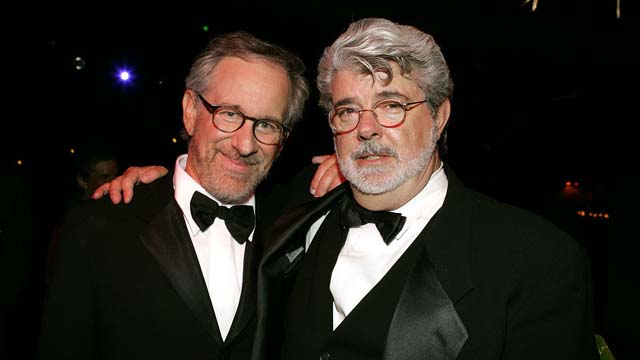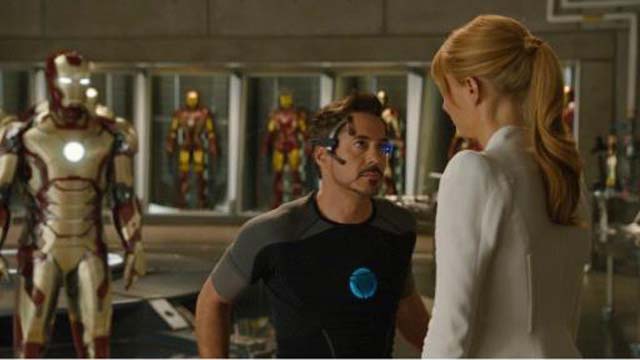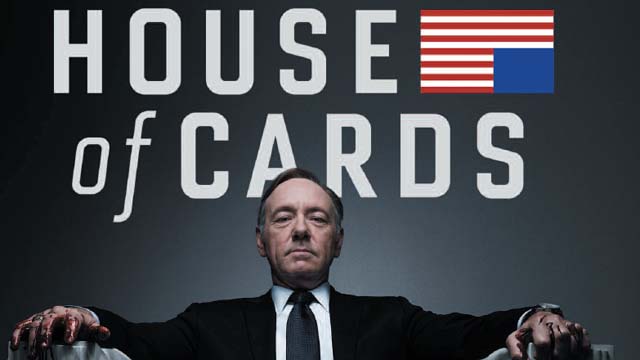
Steven Spielberg and George Lucas spoke to film students at USC this week, presumably to inspire cinema’s next generation as they unveiled a shiny, new building on campus. Instead of uplifting them, though, the picture Spielberg and Lucas painted for aspiring filmmakers was…well, kinda bleak.
The immortal directors used their lectern to preach about a paradigm shift in Hollywood, forecasting a nearby “implosion,” and pointing toward pitfalls that portend a bleak future once they’re gone.
It sounds a bit curmudgeony at first – the older guys in my Frat, after all, said the same thing about life after they graduated college – but a lot of their points were well-reasoned. In case you haven’t noticed, these guys know a thing or two (or a thousand) about their industry.
Here are five facts you need to know.
1. Spielberg and Lucas Had Trouble Producing Recent Passion Projects

Spielberg’s Lincoln and Lucas’s Red Tails have more in common than the prestige of their producers and the historical precedent of their worlds.
They both almost didn’t make it to the big screen.
Spielberg and Lucas (who didn’t actually direct Red Tails, leaving the job, for whatever reason, in the incapable hands of Anthony Hemingway) have seven Oscars between them. From now until senility, they should each have carte blanche to produce what they want.
So it isn’t (that) pretentious for Lucas to invoke the third-person and say, “You’re talking about Steven Spielberg and George Lucas can’t get their movie into a theatre!”
Kind of pretentious? Sure. But you have to admit it: The man has a point.
2. Spielberg Predicts $25 Movie Tickets

And Lucas predicts even pricier ones. Yeah, he’s indulging himself in hyperbole by projecting $150-dollar movie excursions, but that hardly dilutes his point.
Spielberg thinks big-budget flops will eventually spark the accretion. Every time a Battleship or a John Carter comes out, the studios at deficit will try to exploit their already-established franchises.
Mass audiences, presumably, aren’t going to miss Iron Man 3, regardless of the admission price. And as studios get desperate, which they always are after a flop, they have no qualms about taking advantage of their viewers.
3. Studio Execs Are Too Desperate for a Blockbuster

The top-11 grossing films since 1999 are:
- Avatar
- The Avengers
- Harry Potter and the Deathly Hallows – Part 2
- Iron Man 3
- Transformers: Dark Side of the Moon
- The Lord of the Rings: The Return of the King
- Skyfall
- The Dark Knight Rises
- Pirates of the Caribbean: Dead Man’s Chest
- Toy Story 3
- Pirates of the Caribbean: On Stranger Tides
- Star Wars: Episode I – The Phantom Menace
Notice anything? Outside of Avatar – a unique circumstance – the other 10 are all either sequels are iterations of established franchises.
Every studio is swinging for the fences, not caring how many times they strike out so long as one of these days they hit a grand slam. They’ve all basically reduced themselves to being Adam Dunn. And that’s not a compliment.
Per Spielberg:
“You’re at the point right now where a studio would rather invest $250m in one film for a real shot at the brass ring than make a whole bunch of really interesting, deeply personal – and even maybe historical – projects that may get lost in the shuffle.”
Studios reject thoroughly engaging stories if their conclusion is too conclusive. If they’re gonna make a movie people love, there needs to be room for expansion.
But not all good stories have room for a sequel — in fact, I’d argue most of them don’t. A great author knows when his story is over and immediately drops the pen. But studios would rather invest in a so-so script with a nebulous ending than a masterful script with non-negotiable bounds.
Which has prompted a lot of talented people to jump ship…one of the major reasons that:
4. Spielberg Thinks TV is the Future

He’s hardly the first to predict such a paradigm, and some (myself included) would argue that it’s already happened.
As noted above, Spielberg’s Oscar-winning biopic, Lincoln, came “this close” to premiering on HBO, and only got a theatrical release because he, himself, co-owns his own production studio, Dreamworks.
“I think eventually the Lincolns will go away,” Spielberg told the crowd of neophyte filmmakers. “And they’re going to [instead] be on television.”
Again: Spielberg isn’t the first to recognize a shift in medium. Methodical narratives like Breaking Bad and Mad Men have stood in stark contrast – above, not below – to most of the big-budget pap being shown in theaters.
And the slow osmosis of A-list Hollywood talent to television – see: Netflix’s House of Cards, starring Kevin Spacey and directed by David Fincher – has only bolstered that argument.
But hearing these words come from Spielberg – a silver-screen legend, a purist of traditional cinema –surely brings the movie industry into a state of red-alert. If he and George Lucas have trouble financing while M. Night Shyamalan is given $100 million to indulge himself in this, there’s clearly been a breakdown in the system.
5. Steven Soderbergh Feels Similarly
Soderbergh, whose resume includes 23 movies with a 75 percent or higher on Rotten Tomatoes, effectively “retired” from cinema this year, citing many of the same frustrations as Spielberg and Lucas.
His most recent (and final?) film, Behind the Candelabra, received nearly unanimous acclaim at Sundance, but Soderbergh was unable to get it into theatres. It premiered last on HBO – to even more widespread plaudits – but Soderbergh had had enough. He was through with an industry that allowed under-qualified people to make over-qualified decisions.
In January, he told New York magazine:
It’s become absolutely horrible the way the people with the money decide they can fart in the kitchen, to put it bluntly. It’s not just studios – it’s who is financing a film. I guess I don’t understand the assumption that the director is presumptively wrong about what the audience wants or needs when they are the first audience, in a way. And probably got into making movies because of being in that audience.
Soderbergh did qualify his retirement with one important qualification, though, perhaps the most telling part of his farewell:
“I won’t be directing ‘cinema,’ for lack of a better word…[but] I’d do a TV series of something great were to come along.”
P.S.: If you have the time (and haven’t seen it already), you should really watch the entire video above.